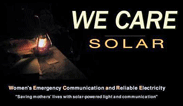Solar News – When Dr. Laura Stachel, from Northern California, started working in maternity clinics in Africa, night brought more than just darkness. It brought challenges and terror we can only begin to imagine. Light is something we take for granted in most places. But some parts of the world, light is sometimes more than a luxury. Light can mean the difference of life and death. Sporadic electricity impairs the operation of surgical wards, delivery wards, essential hospital equipment, and hospital communications.
Darkness and lack of communication equipment compromises the ability of health workers to give safe, proper and prompt medical care. That’s when Dr. Stachel decided to take action. Enter the power of solar energy. Read More –
Dr. Laura Stachel was working in maternity health clinics in Africa and she saw a problem. Actually, she couldn’t see, and that was the problem. Many clinics in remote areas can’t keep the lights on. “The first hospital I went to in Nigeria had grid electricity, but it was only available at best 12 hours a day and often much less,” Stachel tells Alex Goldmark of Fast Company. “The last time I was there in June they only had two hours a day.”
That’s bad news for patients needing emergency surgery in the middle of the night. If the power is out then doctors will either not operate until the lights come back or the sun comes up. If they have to go ahead, it is often by the dim flicker of a candle or a kerosene lamp. Even locating a doctor by foot instead of walkie-talkie could mean a four-hour wait for a patient in need of a C-Section. A dark picture, but Stachel has a hopeful solution, all packed up nicely in her suitcase. Solar energy to the rescue.
It just so happens Dr. Stachel is married to a longtime solar advocate and technical tinkerer, Hal Aronson, Ph.D. Together they decided to create a portable solar power system for these off-grid hospitals and clinics. They founded an organization, WE CARE Solar Women’s Emergency Communication and Reliable Electricity Solar and they invented a solar power unit that fits in carry-on luggage: the WE CARE Solar Suitcase.
The solar suitcase is specially designed with these kinds of off-grid clinics in mind. It is simple to use, it requires far less maintenance than other battery-powered systems, and you can’t really set it up the wrong way, Stachel says. “I consider it an entry-level portable solar system you open it up and it’s ready to go. You just flick on a switch, plug-in a solar panel and you can have electricity because it’s already charged and ready to go.”
If you think plugging in a solar panel is confusing, Stachel says think again. You plug-in two wires and they only fit one way, so you can’t do it wrong. “It takes me about five or 10 minutes to explain to someone how to use it. I usually show them what to do, then I have them repeat it and try to teach me or try to teach someone else.”
We’re not talking megawatts here. This is not a solar power plant for the village. This is a clever solution to a bottleneck in health care provision. “We’ve started using solar for lights, mobile communications devices, and charging up AA and AAA batteries for small medical devices like headlamps, blood pressure cuffs, fetoscopes,” says Stachel. The larger of two power options for the WE CARE Solar suitcase is still just 80 watts enough for 2-3 LED surgery lights for 12 hours, then charging walkie-talkies or cell phones, small batteries and a running laptop. That’s it. These are the bare essentials to up response time and keep a clinic running with a sense of safely after sundown. But that’s a big improvement in a little suitcase.
WE CARE is working with Villanova University to adapt a portable ultrasound and other devices to the limited DC power of the suitcase, tools like an oxygen generator machine that could take room air and convert it to oxygen, a suction machine to use during surgery or at birth to clear a baby’s airways. The key is to get these devices running from DC power the cigarette lighter in your car, in other words.
So far, about 40 solar suitcases have been deployed around the world, in places like Nigeria, Haiti, Tanzania and the border between Burma and Thailand. The portable solar packaging also helps with installation, because, well, there isn’t any. “The only installation would be if you wanted to mount the solar panel,” says Stachel. “Some people put them on the roof, others put them out during the day and take them in at night” especially if theft is a concern, as in a tent city in Haiti where the suitcases offer the only power available. If a doctor needs to make rotating field visits to remote villages, then he can bring the case with him.
Each suitcase now costs about $1,000. Far too much for a clinic that can’t cover the cost of diesel fuel for a generator, so the business model won’t ever be selling to the end-user. The first prototypes that WE CARE Solar has sent out have been covered mostly by volunteers, like Dr. Stachel, who sponsor a suitcase. NGOs working in the field have also purchased about 25 percent of the suitcases currently in use.
Aronson and Stachel are currently experimenting with cheaper construction methods and talking with potential manufacturers so they can scale up and sell the suitcases to NGOs, governments and potentially the World Health Organization.
For any of this to work, though, it has to last. Stachel and Aronson have done what they can to make these things keep buzzing without any upkeep. “We designed it to be very low maintenance,” she says. “The batteries are sealed and don’t require any distilled water on a monthly basis like a traditional flooded battery.” The panel can be replaced with a bigger one if needed, same with the portable battery.
Eventually, of course, maintenance and battery replacement will inevitably be an issue. “In the long run, it’ll be good to have people around who know how to maintain and change batteries,” says Stachel. “It has to be simple enough for an obstetrician to use. If I can use the solar suitcase, that’s usually a pretty good sign someone else in the health care field can do it too.”
Getting a suitcase filled with all those wires, a solar panel and batteries through airport security may be different story, though Stachel claims she’s never had a problem boarding a plane with one. Whether the TSA might have a problem remains to be seen.
